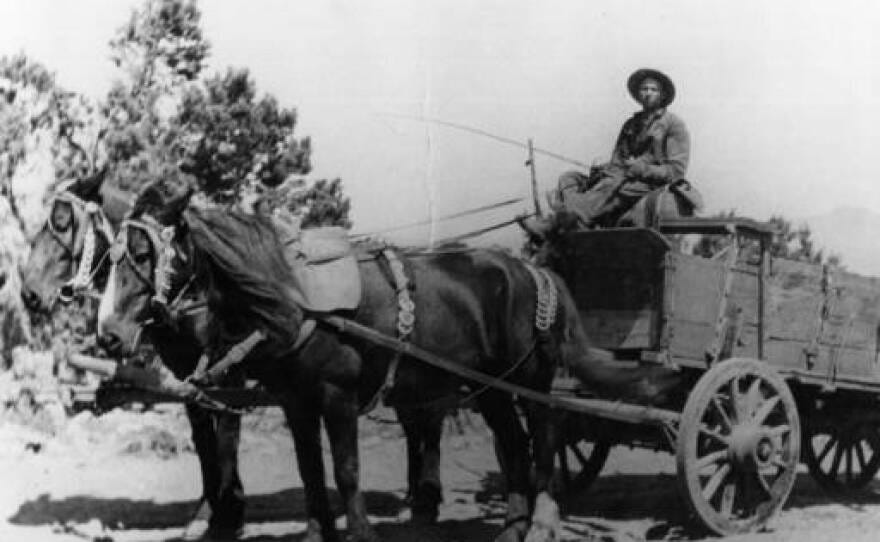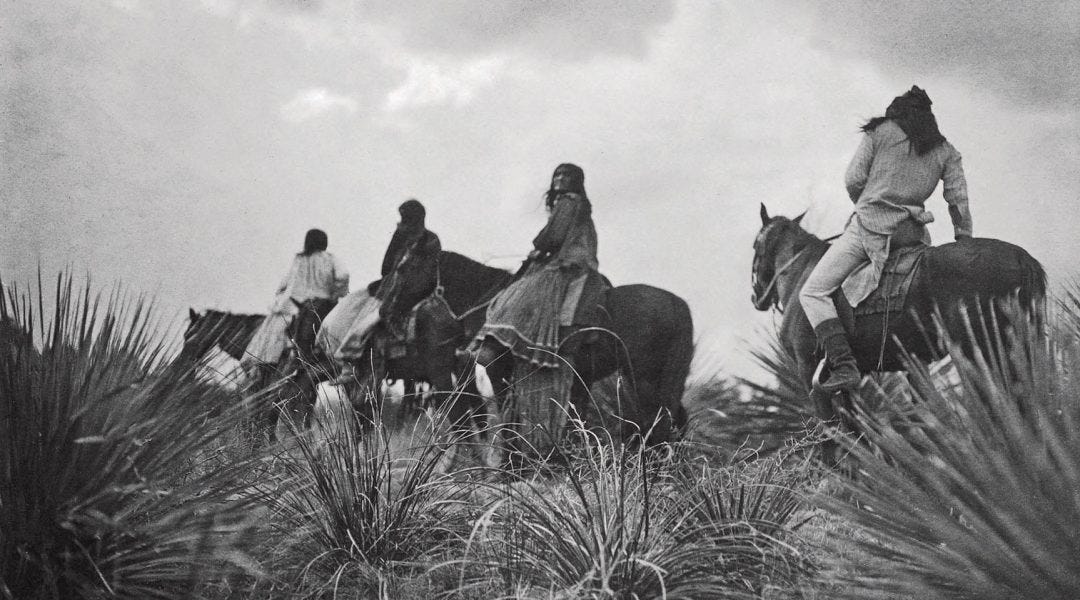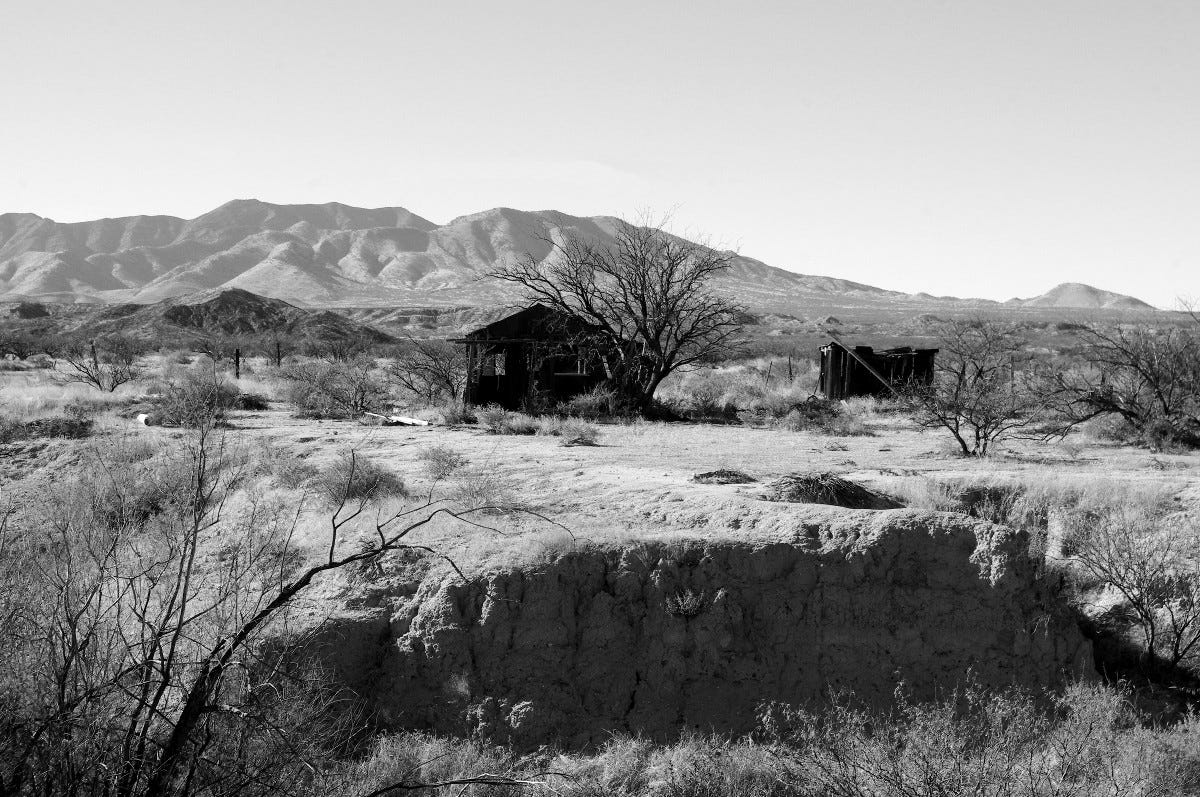“…respect for the memories and deeds of our ancestors is security for the present and seed-corn for the future.” —Richard Taylor
Lares and Penates
Somehow through the centuries my family has managed to retain some of that “older religiousness” of the early American yeoman. We still have our own lares and penates and groves and sacred waters, and next to prayer, our most cherished daily ritual is consulting our dead. We have never forgotten that the will of the Fathers is that of the Almighty.
When I was a boy, I could expect to hear how my behavior would be judged not only by God and His angels but by forebearers long past. And that they too would have their say when all is said and done. My blood was never mine alone.
And so I was inducted into a great family tradition at an early age, and carefully tutored by our family annals; the stories of my people—some centuries old—occupying the same place in my heart as tales from the King James Bible. For through these memories handed down, generation after generation, we know "who we are, where we are, where we belong, what we live by, what we live for.”
Most people today don’t seem to know who they are or where they belong, much less what to live for. There’s always some new flag or fancy slogan to hide behind, but the poverty of their spirit still causes them great pain and confusion, nonetheless. And so they twist in the wind.
Perhaps they’d be better off looking backwards and consulting their dead.
A Serious Man
One night while digging through some of my own family history, I came across a copy of my great-great-great grandfather’s diary. One the pages, aptly titled “I Shot a Man for Seventy-Five Cents,” instantly caught my eye. It’s not every day you find one of your family’s great patriarchs nearly killed a man over some pocket change.
Now this story is every bit as hair-raising as it sounds—and I’m half-tempted to share it—but for now let’s just say that it piqued my curiosity. For the better part of an evening, I pored over page after page of this diary, eager to know my grandfather and better understand what made him into the tenacious man he was.
As it turns out, this grandfather of mine was what people from those days called a serious man. His father was some kind of outlaw and wound up swinging from a tree when my grandfather was just learning to walk. And so the boy scraped around and starved for most of his childhood on the edge of civilization—in a place where Indian massacres and highway robbery were not uncommon. It was still a wild and hungry country then, with everything up for grabs. And so when grandfather was old enough to buy his own horse, he set off for the wilds to find his fortune—those early years of want driving his every step.
After cutting his teeth in the wilderness, Grandfather—a little stronger and wiser, and with a pocketful of coins—returned to those bare-bones of civilization he had left years before. He scooped up his sick mother, found himself a wife, and they all set out together for a new country. Sure his neighbors would remember him as hot-tempered, hard as a nail, and deadly serious, but as a husband, father, and dutiful son, all that severity and grit seem to have been transformed into devotion. And the setbacks, travails, and every cosmic injustice just made Grandfather more able to overcome the next—all for the ones he loved.
Three Trials and Three Acquittals
Three trials in particular appear to have made quite the impression on my grandfather, enough that he would bother to write them down and honor their memory for the rest of his days; three trials—of body, mind, and soul—and three acquitals all the same.
Body
To support his aged mother and a growing family, Grandfather hauled freight for some mining camps out West, braving some of the most treacherous country in the world with nothing but a pair of mules, a .45, and a load of flour, eggs, and fruit literally worth its weight in gold.
After dropping his load in a mining camp in some nowhere place, Grandfather found himself alone in a ragged canyon. At one point the road ended and the terrain became so steep Grandfather couldn’t turn the wagon. So he made use of a lever and sat on it, hoping his weight would be enough to keep the outfit from overturning. But it wasn’t enough, and when the wagon rolled, it snatched him by the leg and broke it clean at the knee.
Grandfather laid there in that empty canyon for the rest of the day under a fiery sun, not a soul around to hear him scream. But when night fell, a lone Indian approached him from the dark, freed his pinned leg, and built him a fire. The Indian rode ten miles that night to find help. Grandfather eventually wound up having his leg reset by a doctor, but the knee was never returned to its socket, and so he lost a good leg that year. After a fight with a fever the following summer, his hearing would be taken as well.
For the rest of his life, Grandfather would grind and strain against the world as a deaf cripple, but somehow his family would never go hungry. And he never once complained.
Mind
A few years later, Grandfather won himself a freighting contract down in old Cochise County, which was teeming with rustlers, Rurales, Confederates, and Apache renegades. During this time, Grandfather would take his wife and children with him from town to town.
From his son’s diary, who was just a young boy at the time:
On our way to Wilcox, we were down in a canyon and came upon a wagon in the road with a span of black mules lying dead—all still hitched to the wagon. A dead man was lying over the brake lever, face down with three shots in his head. His boots had been taken, along with the horses’ lines and bridles. We could do nothing; only turn around and go our own way.
We left the canyon and soon came to a spring, which was a public camping place. Mother didn’t want to stop there, as she was sore afraid. So Father finally relented, saying, “Well, if we must go, okay, but one place is as safe as another.”
We went on for a few more miles and found a place to make camp. We didn’t know it at the time, but three other wagons of families camped at that spring were killed by Indians the next morning—just before daylight. Father did not seem to sense the danger, though I’ve never known him to have any fear.
The next morning we had gone a short ways when Mother noticed a dust rising ahead of us—like dust from a whirlwind. She just knew it was the Indians, but Father evidently didn’t think it was—at least he tried to persuade her otherwise. Finally, we could see them distinctly; heads bobbing up and down as they galloped toward us. They were coming fast, and once they reached the base of the hill we were on, they disappeared out of sight.
Without a word, Father got his .44 rifle from the wagon and told his man Nute to grab a gun and get it ready, which Nute did. But Nute began to cry through fear. Mother was also crying, as were us kids. We all knew we’d be butchered.
Father then said to Nute, “I will take the first one, you get the next. Don’t be afraid. We will die like men, if we have to.”
We waited there, Mother and the girls crying, Nute shaking, and Father just silent as the grave.
When the party came up over the hill, we could see the their caps and the blue of their coats. To our happiness and joy, we discovered they were not Indians but soldiers, hot on the trail of the half-breed Indian outlaw some called The Apache Kid.
Soul
There were good times and bad, thick times and ones thin, and somehow through it all, Grandfather was able to support a wife and a pack of seven children. The family never starved, but some seasons they got awful close. Bad luck was always on the prowl in that hungry country.
One year a neighbor borrowed a wagon from Grandfather, and loaded it so heavy with long timber that every spoke in the wagon’s hind wheel snapped. There was no blacksmith or wheelwright for miles, so Grandfather had to pack the broken wheel and take it 15 miles to the nearest town for repair.
After paying for the wheel, Grandfather didn’t have enough money to buy flour or other groceries, and his stores back home were just about empty.
From his diary:
After getting a man to start on the wheel, I went to a nearby store to try and get what the family needed on credit. The merchant there listened to me a while as I told him about my prospect for a crop, but then said, “We don’t do business that way here. We have only a small capital. We could trust out all our goods, and in ten days we wouldn’t have cash to restock the store.”
You cannot realize how discouraged I felt: a stranger in a strange place, no money, an aged mother, and a wife and seven children looking to me for support. And I had no idea how to provide for them.
I went up to the man’s home who was repairing my wheel. It was dinnertime and he asked me to eat with his family. I was seated by the wall in that very small kitchen, my mind turning and turning.
I noticed a motto or a promise or a prophecy of some sort written on the wall nearest me. It said:
Trust in the Lord and do good; so shall you tarry in the land and ye shall be fed.
Well, it seemed to me as though that promise had been put there for my special benefit, so I took it to heart, even though I’d just been refused credit by the only man who I thought could help me. In that room I became convinced that the Lord would help me by opening a way for me to provide for my family. No, I didn’t expect the Lord would send me an angel with a sack of flour on his shoulder, but I did believe He’d open a way for me to earn it.
So I went back to the merchant and said, “Mr. Becker, you just refused me credit, but I cannot take ‘no’ for an answer. You have goods to sell that I’m badly in need of, and I am an honest man and will repay you.”
He said, “Well, all right, you can have what you need.”
Now what had changed his mind in an hour? I cannot say. I was unknown in those parts, and he couldn’t have met anyone who knew me in the meantime. I am as well satisfied that it was the Lord who changed him as I am of anything.
“Well,” he asked, “What will you have?”
I said that I needed flour worse than anything else, but he said he had neither flour not the money to send for it. Well, of course I felt disappointed, but I was not downhearted. I got bacon and sugar, and then I went and got my wheel and headed for home.
On my way back, I came up to a little store kept by Old Father Brown just a few miles away from my home. I thought it just might be possible that he had some flour. I told him there was none back in town, and that I hoped he could sell me some on credit.
“Brother,” he said, “I don’t want to hurt your feelings, but I’ve only got seventy-four pounds of good shorts and no flour to sell.”
After a few minutes, I wished him good day and started out.
As I was leaving I heard him say, “Here, why don’t you take some of this flour.”
He walked up with a sack of flour in his arms.
“You know it takes money to buy flour, and I don’t have a cent,” I said, “I’m broke.”
“It does,” said Old Father Brown, “But I paid money for this flour once, and I think that’s enough. You take this here flour back to your family.”
God rest his soul.
Trust in the Lord and do good; so ye shall tarry in the land and verily ye shall be fed.
You’ve never seen a happier and more thankful family than mine when I walked in with that sack of flour.
…
Sometime before this, I was working in the field when one of the hardest-looking men I’ve ever seen came and wanted to hire out one of my work horses. He said his family was in Socorro and that he wanted to move them to a ranch closeby, but one of his horses had died.
He told me a straight hard luck story.
I had only three work horses at the time, but I let him have my best one anyway. The hard man promised to pay me fifty cents for every day he had that horse, and he said the total would be paid in cash or flour once he returned in three weeks’ time.
My neighbors laughed at me for letting some tramp take my best horse. They said I’d never see the hard man or my horse ever again. But I felt good about my decision.
Shortly after I returned from town with my wheel, here comes the hard man on my best horse with three sacks of flour on his back.
Trust in the Lord and do good; so ye shall tarry in the land and ye shall be fed.
The Hungry Country
Hard to imagine anyone could think we live in a hungry country today. Everyone is well-fed and penned up with a million creature comforts. Happiness is a pill, murder a mystery, and hunger is just a game. It’s hard to imagine stumbling around in an unforgiving wilderness with a bum leg and dead ears, or worse, bargaining your empty stomach on a prophecy scrawled out on a stranger’s wall.
But perhaps this country of ours is hungrier than we realize. Notwithstanding all the gratification and ease, do our souls not cry out? If there is something lacking in this strangely savage Pleasure Island of ours, it seems to have something to do with our spirit. Though able-bodied and flanked on all sides by mollycoddling machines, we also grind and strain against the world. And in our quiet desperation, do we not hunger for some motto, promise, or prophecy to deliver us?
Are we not all twisting in the wind?
I tend to think we’d be a lot better off holding onto what remains of that older religiousness that our forefathers held so close, remembering our own lares and penates, and along with daily prayer, taking the time to consult our dead.
After all, our living blood does not belong to us alone.
When I search the words of my grandfather, dictated so long ago on the edge of civilization, I taste something familiar and real. And through all his pain and hunger, there is relief—even for the hungriest soul twisting so sadly in the wind.
Note: The Hungry Country: Addendum—I Shot a Man For Seventy-five Cents is now posted (for all paid subscribers)









This is high art. Really speaks to me.
Was very inspired reading this man. God bless your family.